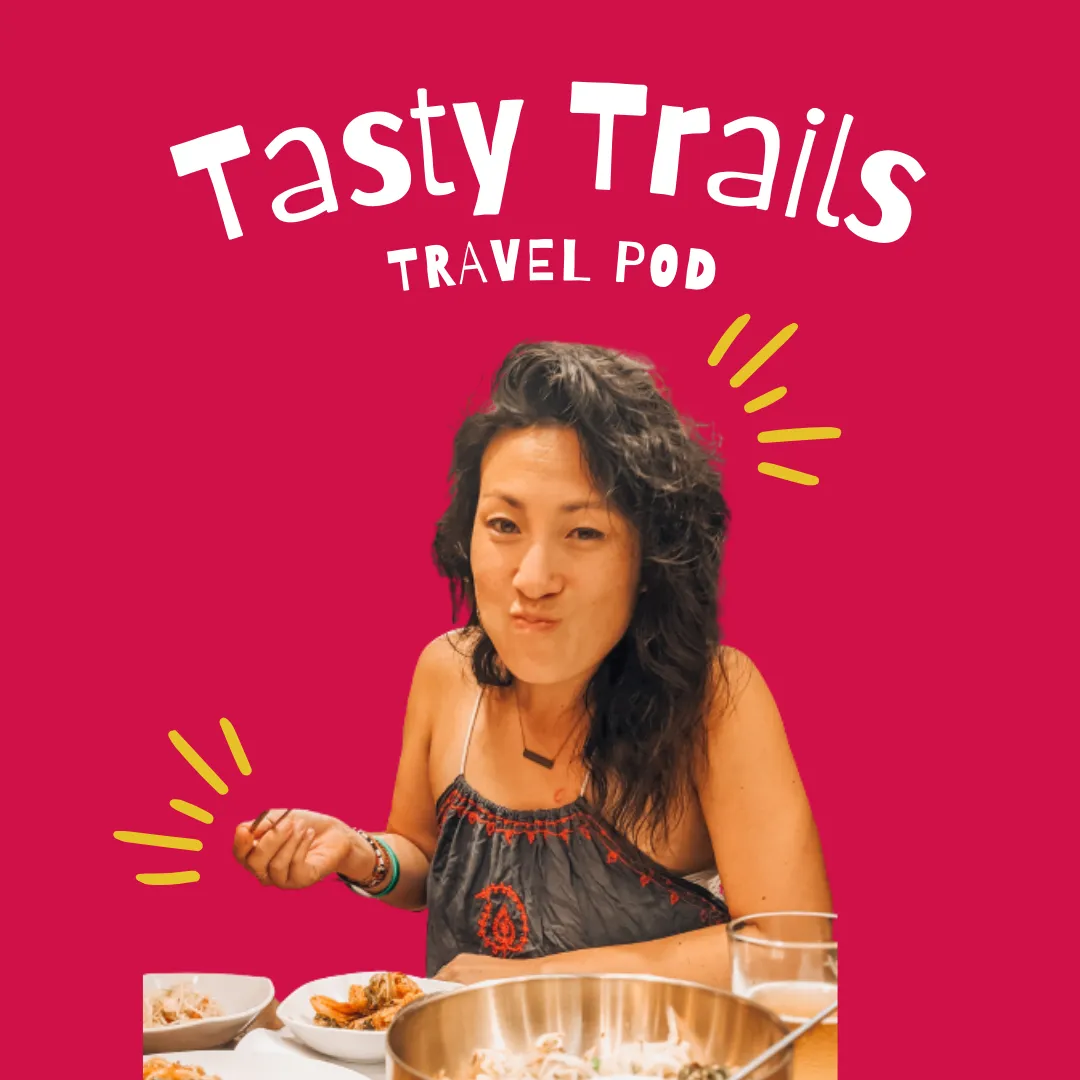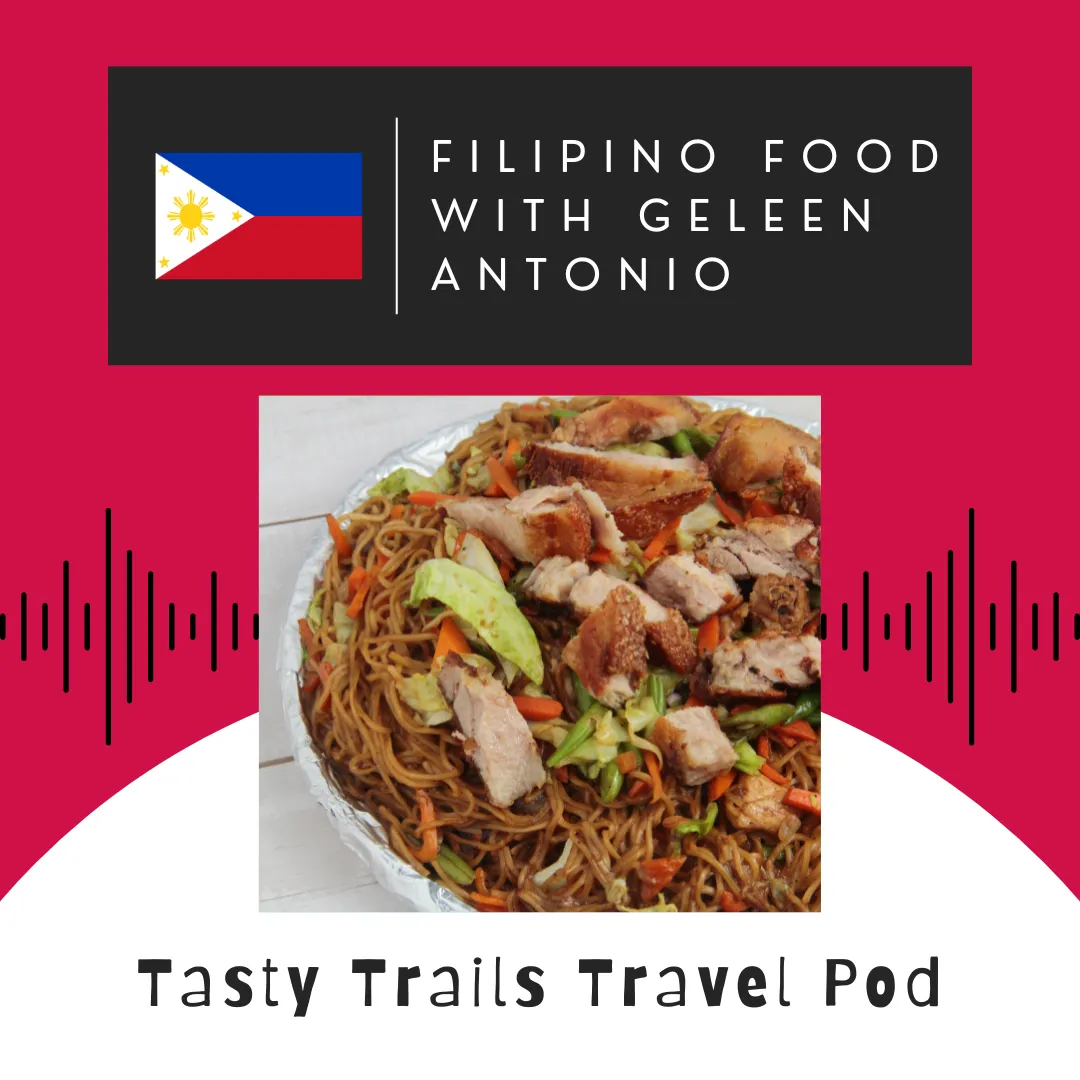PODCAST
Tasty Trails Travel Pod
Listen & Subscribe

About the pod
Tasty Trails Travel Pod is all about getting to know new places and cultures, and we're doing it through food.
Food is a universal language. It is one of the best ways to connect with people, to share stories and to make memories.
Through the podcast we meet people from all over the world who share their culinary expertise along with their culture and how we, as travelers, can explore and get to know their cultures better when we visit.
Join us as we dive into a world of flavors and uncover the stories behind your favorite dishes. So tuck in and let’s go!
Bon appetit!

Filipino Food with Geleen Antonio
Introduction:
Born in the Philippines and raised in the US, Geleen Antonio is a full-time digital nomad who has been traveling for the past four years. The Filipino American has been empowering women to embrace solo travel and start meaningful global connections. She has also been finding Filipino food wherever she travels.
Geleen is passionate about discovering Filipino restaurants and checking what they have on their menus. She also likes finding out about the Filipino chefs working in those restaurants. Geleen's mom is a great cook who is passionate about making excellent Filipino Food. She learns about Filipino cooking when she is in the US or on vacation in her native country, the Philippines. Today, she will teach us more about Filipino food and share a bit about Filipino culture.

If you want to listen to the whole interview with Geleen you can find it below!
Popular Filipino Dishes
Filipino food is diverse, so there are plenty of favorite Filipino dishes. Adobo is one of the famous Filipino dishes featured prominently in most Filipino events, from Thanksgiving to birthday parties and holiday celebrations. Filipinos make this dish with pork or chicken, although some coastal communities substitute meat with seafood. It’s a delicious stew with vinegar and soy sauce, an essential ingredient that makes the foundation of Filipino cooking. Adobo is Filipinos’ national dish and a trademark of Filipino cuisine.

Sinigang is another Filipino favorite dish. It's like a sour soup from beef and beef bones. It can also be a seafood-style soup with plenty of veggies in it. You eat the soup over rice, which is the typical way of eating most Filipino foods. Bopi is a popular, spicy Filipino dish and a staple for most Filipinos in the Philinepess islands bordering China. It consists of chopped hearts with spices. The heart is mostly beef. The dish is so delicious, especially when you make it really spicy.
Immigrants from the Chinese Fujian province brought lumpia to the Philippines. Lumpia is a rolled pastry stuffed with a special filling known as lumpia, literally meaning moist cake. The stuffing consists of vegetables or meats. Lechon is a cherished Filipino dish used to mark many traditional and holiday celebrations. It is a whole pig grilled over charcoal. Filipinos roast the whole pig with salt and pepper seasonings and then dip the meat in sauces rich in garlic, brown sugar, onion, and vinegar.
Kare-Kare is a fantastic Filipino delicacy and a preserve of special occasions, thanks to its detailed and long cooking process. It originates from the Philippines' Pampanga province. It comprises meats like tripe, pork hocks, beef stew cuts, and oxtails. Preparation entails simmering the meat for hours to make it tender enough to turn into a stew with various vegetables like long beans, eggplants, and banana hearts. For added flavor, Filipino chefs usually add ground peanuts to the dish. They also thicken the stew with toasted ground rice.
Pancit is a word that refers to different traditional Filipino noodles. Different types of pancit derive their names from various types of noodles, cooking methods, ingredients, and places of origin. Pancit dishes are a staple of the Filipinos, and they are served with other dishes, including calamari.
Bibingka is a baked rice cake. The dish is among the many rice cake variations Filipinos have consumed for centuries. The baked rice cake tastes sweet, like rice pudding. Filipinos traditionally cook bibingka in terracotta ovens. It is a popular breakfast dish, although some Filipinos have it as an afternoon snack. You can serve Bibingka with toppings such as grated coconut, butter, cheese, sugar, and margarine.
The Role of Spam in Filipino Culture
Spam is a canned meat. Filipinos love spam because it’s delicious and rich in protein. Almost every Filipino family has a spam cabinet to store spam, separate from other food items. Geleen, too, has a spam closet or simply a shelf she uses strictly for storing spam.

"Yeah, we have a spam cabinet. We devote the cabinet to spam and use the other shelves to store other canned goods. But, yeah, spam is huge," says Geleen.
Spam is everywhere in the Philippines. It’s part of the breakfast for most Filipino families. It’s super easy to prepare spam. You can fry the canned meat on its own, with eggs, or over rice. Geelen, however, only loves fried spam because ordinary spam is salty and rich in flavor.
Interestingly, her uncle, an avid mountaineer who requires plenty of supplemental protein, has spam as his snack. After a hike, his uncle grabs a can of spam from their spam cabinet and snacks it out of the can instead of eating it with a fork. She thinks her uncle does this after his hikes to replenish the lost proteins.
Filipino Culture
One distinct aspect of the Filipino culture is that Filipinos love celebrating. They are warm and welcoming. They love to eat and party; food is a vital part of Filipino culture. Filipinos are super crazy about Christmas. They start celebrating it in August. They spend four months, from September to December, celebrating Christmas. They call these months the “Ber” months."

“Christmas is huge in Filipino culture. Filipinos start celebrating Christmas four months in advance. They describe these months as the ‘ber months, or Christmas months. I saw Christmas decorations when I was in the Philippines in August. Filipinos are in a wild Christmas mood from September to December," says Gelen.
Filipinos also love parties, and food is an invaluable item during birthdays, Thanksgiving, and Christmas parties. They prepare whole-roast pigs and feast with large families during their home parties. Overall, Filipino culture is about celebrating, and food is an indispensable part of it.
Final Word About Filipino Food with Geleen Antonio
Filipino Dishes are diverse and delicious. Generally, Geleen believes Filipino food has plenty of Chinese influence. It also has a bit of Western influence to bring out the best of both cultures. It's easy to make Filipino cuisine vegan and veggie-friendly.
Connect with Geleen to learn about Filipino cuisine and cooking on her Instagram page, Filipino Food Travels. You can get a bit of her bio and information about different Filipino restaurants across the world and the Filipino cuisine these restaurants offer on their menus.
Does this episode ignite your passion for traveling? If you're planning a holiday, visit Tasty Trails Travel Pod for simplified and detailed information about worldwide travel.
Connect with Geleen!
Travel Not To Escape Podcast
Sign up for the newsletter!! Each month I'll be sending out a newsletter with insider tips Sign up HERE!
***Looking to experience the flavors we've explored firsthand?
Skip the stress of travel planning and work with a trusted professional to take care of all of that for you!
Travel Trails specializes in crafting unforgettable travel experiences tailored to your taste for adventure.
Don’t miss out on tasting these delicious dishes because you don’t have the time to plan.
Visit https://travel-trails.com/ to learn more and follow
@TastyTrailsTravelPod and @Travel.Trails___ on Instagram to stay up to date on episodes and all things food & travel
Apply to be a guest
If you have a deep connection to a specific culture and food, we want to hear from you!
© Copyright 2024 Travel Trails, LLC
